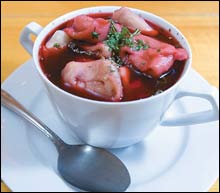

Beef Borscht at Cafe Polonia |
Like black ice, soup season comes around when it’s bone-chilling and dark and you’re craving something warm to curl your hands around. Nearly every ethnicity and cuisine has a hot, soul-thawing soup in its arsenal; soup bends to every spice, meat, vegetable, legume, and grain, and its components depend only on the whim, wit, and wisdom of the chef. The best thing about soups? Other than in big industrial kitchens, soup recipes change every day: a little of that left over from the night before, the extra vegetables the prep chef chopped, the last links of homemade sausage in the fridge. The art is in blending the flavors so that, as in a successful chemistry experiment, the end result explodes with flavor.Still, while almost every restaurant in the city has some sort of soup on its menu, only a few have raised it to a high art. For one thing, soup isn’t usually a dish for the high-end restaurants. (“It’s hard to make a soup meal a worthwhile business strategy unless you shave truffles on top,” notes Domani’s Rene Michelena.) So although there are many highly refined soups with complicated, labor-intensive reductions, some of the best soup can be found at ethnic restaurants and smaller bistros, where a bowl of soup isn’t just a warm-up, but the whole show. (A plea to chef Laura Brennan, the soup queen of Boston, who just shuttered her Caffè Umbra in the South End: my fervent hope is that she finds a new place to start ladling out her warm, wonderful soups –– and soon.)

This being New England, we obviously have fantastic fish stews, soups, and chowders. They may all look similar, but they differ significantly in their subtleties. Think of the thick, stand-up-your-spoon-in-it fish chowder at the No Name on Northern Avenue, the famous inaugural clam chowder at Legal Sea Foods, the chockfull-of-clams chowder at Summer Shack, and the delicate clam chowder at Turner Fisheries. Winter winners all, and while they might be visually identical, the trick is in the nuanced spicing, the bacon or ham for flavoring, the size of the chunks of potato and celery, the freshness of the fish. Enough with the clams? Visit the North End for Neptune Oyster’s oyster stew, a sort of seafood minestrone that’ll keep you cozy enough for a walk along the waterfront. As for fish soups and stews, the non-white versions are just the thing when you want soup that sips more than it slides. The Portuguese have their version of fish soup, and it’s done well at Atasca in Cambridge. So do the Mexicans — try Olé in Inman Square.
Still, it’s the Italians who may win top honors for making soup into an art form. Any respectable bowl of Italian soup will hit all the food groups, with beans, vegetables, pasta, and a sprinkling of cheese fighting for space in every spoonful. And Italian soup goes way beyond minestrone. There’s the classic Italian wedding soup (Caliterra sometimes makes a mean one): chicken broth with orzo and little meatballs. And there are the thick, tomato concoctions, often with vegetables or homemade pasta, like the ones at Carlo’s Cucina Italiana in Allston. Or there are the creamy bisques, which often feature puréed butternut squash or pumpkin. Domani has Zucca, a Long Island pumpkin purée cut with ricotta and homemade chicken broth and served with fresh sage and amaretto cookies.
French technique allows chefs to do anything they want with soup (and to suck up hundreds of man hours in the process). At its most refined, French soup runs from translucent, cosmopolitan consommés to rustic, opaque vichyssoise the density of wallpaper paste. While I admire the finesse of these elegant broths, in the winter I lust after classic crocks of French onion soup, opulent with bread and cheese, gooey and delicious. In Boston, some of the best bowls of French onion soup I’ve had were at Petit Robert Bistro, Brasserie Jo, Aquitaine, and Hamersley’s Bistro.
Over in South Boston, Café Polonia is a secret haunt for many soup lovers. Among its fabled offerings: a sour-pickle soup with grated pickles, and several versions of Polish beet borscht. People in the know also rave about Rachel Klein’s borscht at OM, sometimes served as a special. In the past few weeks, I’ve had a fab mulligatawny soup at a little Indian restaurant in Belmont, a huge bowl of gumbo at Redbones in Davis Square (the chunks of chorizo make the dish), a vast lemongrass-and-curried-chicken soup at Pho Lemongrass in Brookline, matzo-ball soup at Zaftigs, a Thai coconutand- basil soup at Tamarind House in Cambridge, a French-style oxtail soup at Eastern Standard, and a half-dozen cups of hot-and-sour soup and big bowls of Vietnamese chicken noodle at holes-in-the-wall all over town.
Ethnic and regional creativity and flavors are unstoppable when it comes to soup. Nearly every animal and vegetable has soup potential. Fish or fowl, soy or chickpea, tamarind seed or lotus root — all find a home in the pot and on Boston menus, safe until the first hint of early-season cream of asparagus reminds us that it’s time to start eating green again.